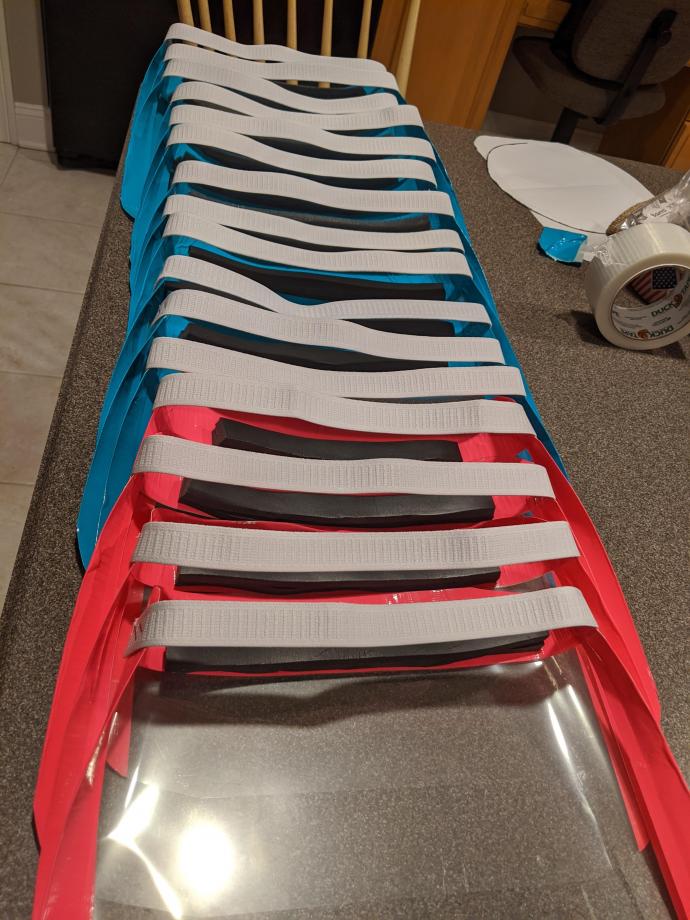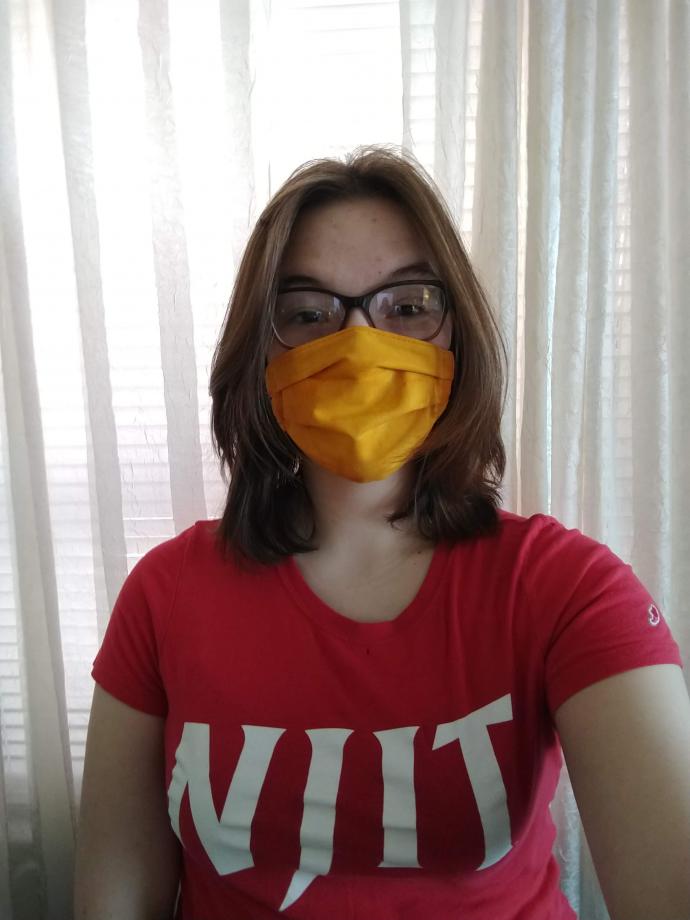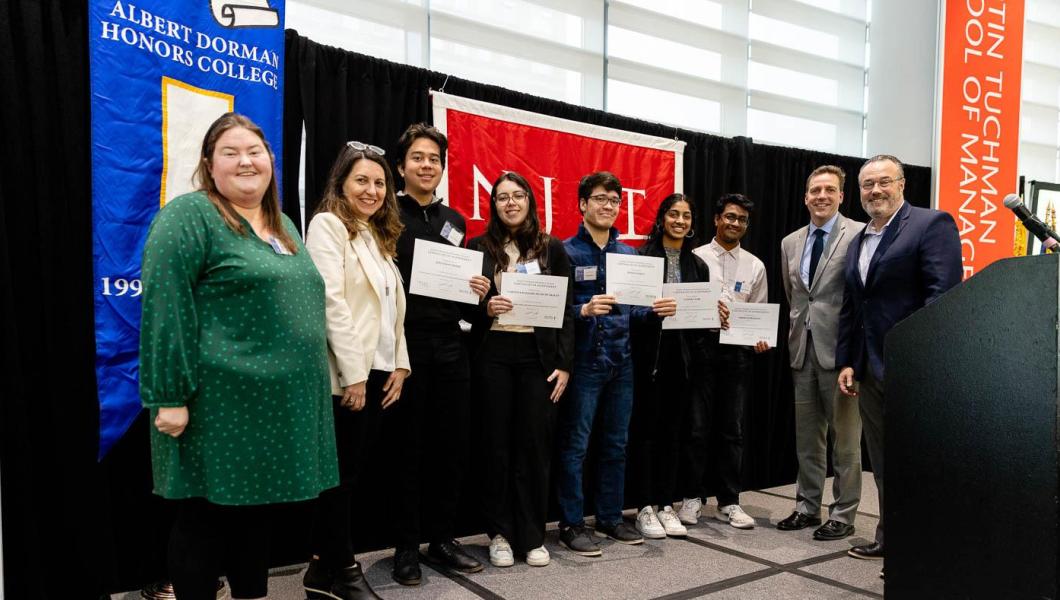Meeting the Demand: Honors Scholars Produce Hundreds of Personal Protective Equipment

It all started with an email sent by NJIT/Albert Dorman Honors College (ADHC) alumnus, Biren Bhatt, M.D., to Louis Hamilton, ADHC dean, as the coronavirus pandemic was spreading with lightning speed throughout the New York-New Jersey area. Dr. Bhatt, an attending emergency physician at Hackensack Medical Center (HMC), asked the dean to put out a call to Dorman Scholars to design and create a prototype for a face shield, vital personal protective equipment (PPE) for health care workers.
Without hesitation, the Honors College sprung into action. The very next day, a Saturday, it messaged its student body that it was holding a competition for both face shield design and production — offering Amazon gift cards as incentives and providing a supplies list that included marine-grade vinyl, industrial tape, foam and elastic. Interested scholars were directed to visit CDC guidelines for compliance regulations, and to consult a video of New York City nurses making shields. Over that weekend, nine designs were submitted by some 20 scholars working either individually or on teams, and then sent to Dr. Bhatt and HMC for approval.
The design they green-lighted was from Greg Tanis, a mechanical engineering major graduating this May. Tanis also produced the highest quantity of face shields — more than 500 — by the end of that week, delivering them to Valley Hospital, which was in urgent need.
“I happened to have [the necessary materials] laying around my home,” said Tanis, adding that he went through a lot of trial and error perfecting his design. “I was really just trying to keep it as simple as possible.”
Once he received the go-ahead to create more, he headed to Staples, Walmart, Home Depot, Lowe’s and Ace Hardware to secure supplies. He produced the first 50 by himself, but knowing that production required ramping up, he assembled kits with instructions and materials and tapped into his personal network for help. A crew of friends stepped up and continues to assist him.
HonorsPPE-GregTaniswithShield.jpg

At the same time, Laura Gould, a third-year architecture student and fellow Dorman Scholar, was already creating and sending triple-cotton masks to Mount Sinai Medical Center in Manhattan. Modifying a design from a YouTube surgical-mask tutorial, and working with her mother, she had sent the hospital 200 masks.
“My mother and I heard about the 100 Million Masks challenge in Washington, and we were really excited about the opportunity to serve the community. My thought process was basically, ‘I don’t have any medical experience, but I can sew, so I would be remiss not to help during this public health crisis,” said Gould. “When the ADHC put a call out for face shields, I let them know that I was making cloth masks to go with them.”
The crucial need for both shields and masks hit close to home when, just days after the Honors College’s call went out, another Dorman Scholar, third-year biology student Constantine Baltzis, approached ADHC for help with personal protective equipment for the Lyndhurst Police Emergency Squad. Baltzis is a squad member (he also belongs to the NJIT Emergency Squad), and Tarcisio Nunes, an Honors alumnus, is the squad’s captain. They received approval from the squad’s medical director for use of Tanis’ face shield and Gould’s mask and requested a hefty supply, prompting the Honors College to put out a second call to its scholars with an expanded competition to tackle the growing demand. The squad received an initial 50 shields from Tanis and 50 masks from Gould.
“NJIT was able to provide masks to us when we needed them the most. We were able to extend our N95 supply and continue to serve the community,” commented Nunes. “It is with donations like these [that] we will be able to continue to serve safely.”
“I approached Dean Hamilton with just a nugget of an idea — that there was a critical need for PPE among health care workers — and that NJIT students, with their problem-solving abilities, would be uniquely positioned to help,” Dr. Bhatt remarked. “The students ran with it. … I am amazed by their ingenuity and humbled by their generosity. These are really talented, big-hearted, hard-working students.
HonorsPPE-LauraGouldMakingMasks.jpg

Managing the Logistics
The process of reaching out to students, fielding requests and responses, and facilitating deliveries when necessary takes a whole lot of coordination. Naira Abou-Ghali, a biology scholar of both ADHC and the Ronald E. McNair Post-baccalaureate Achievement Program, took on the challenge and is spearheading the initiative.
“I had reached out to Dean Hamilton separately to ask what ADHC could do the day before the initial request from Dr. Bhatt arrived, and he asked if I could help organize the effort,” said Abou-Ghali, the college’s 2020 recipient of the Dorman Future Leader Award.
While students have been responding to the second call to produce shields and masks, Abou-Ghali noted that “some scholars who are not participating with us at present are helping out locally and so we are receiving more requests for support.”
ADHC production is being bolstered in part by the Makerspace at NJIT, which is providing a safe venue along with fabrication tools, such as laser cutters, to Dorman Scholars should they need a construction space. The facility itself is creating face shields and has set up assembly stations that follow social distancing guidelines; it is looking for volunteers to construct shields with pre-cut materials to fulfill appeals for personal protective equipment from local and national health care professionals and hospitals.
“This is about rapid, distributed manufacturing,” noted Hamilton of the Honors endeavor, pointing out the measures that are being taken to ensure quality and usability. “Greg relays that Valley has been using hydrogen peroxide and alcohol to clean the shields and has not expressed concerns about durability. So far the challenge is getting more students involved so that we can ramp up production. As more students get involved, our point people at the hospitals will be the judge of quality.”
Nine designs were submitted by some 20 scholars working either individually or on teams.
Hamilton’s Dean’s Fund for Student Development offered to reimburse scholars who produce shields and masks with service-learning grants, but they first needed to submit a budget for approval. Financial assistance “is highly dependent on how much they will be producing, the cost of their operations, and how much support they request from the fund,” Abou-Ghali explained, adding that students were encouraged to seek donations as well.
Tanis’ face shield costs roughly $1.75 per unit to make, with a yield of 8-10 an hour. He has spent a little over $2,000 out of pocket and raised nearly $1,500 through GoFundMe to date, and anticipates receiving aid from the Dean’s Fund. He also is scheduled to receive two Amazon gift cards through the Honors competition.
“The hope is I can raise on my own as much as possible. … And something that’s really encouraging is when nurses support the GoFundMe, that’s when I’m like, ‘OK, they’re using these things and they appreciate it.’ That’s something that really motivates me,” said Tanis, who thus far has delivered more than 1,400 shields to eight hospitals and the Lyndhurst Police Emergency Squad.
Gould has covered her costs as well, at about $0.56 per mask for 500 thus far, partially through a Venmo account for donations. She, too, will receive an Amazon gift card from ADHC along with support from the Dean’s Fund. She expects to produce 1,000 in total and, in addition to Mount Sinai and the Lyndhurst Police Emergency Squad, has donated a supply to Valley and Pascack Valley Hospitals. She has also prepared 50 masks for Makerspace volunteers who are making face shields, and is teaching them how to make the masks as well.
“For hospitals in New York City, we meet with a nurse about halfway between our houses and theirs. For closer hospitals, nurses have volunteered to come to our house to pick up the masks,” said Gould about her delivery protocol, which mirrors that of Tanis’.
With the pandemic in the New York-New Jersey area growing, demand for ADHC shields and masks continues. More recently, Daniel Meshoyrer, D.O., an ADHC alumnus who practices family medicine at Nassau University Medical Center, heard about the college’s initiative and requested 40 face shields. Tanis got them there within days, and Meshoyrer distributed them to his department colleagues. An additional 100 shields have since been delivered and used in the hospital’s internal medicine department.
The shields “have been well received, and are actively being used on the floor and in our ICU. Less than an hour ago, we intubated a patient where a resident and I had the face shield on,” related Meshoyrer. “It means a lot to us and allows us to safely continue treating patients.”
HonorsPPE-AlumDr.Meshoyrer#2.jpg



